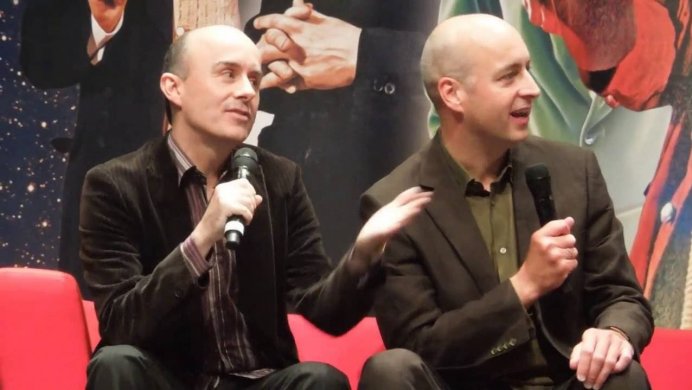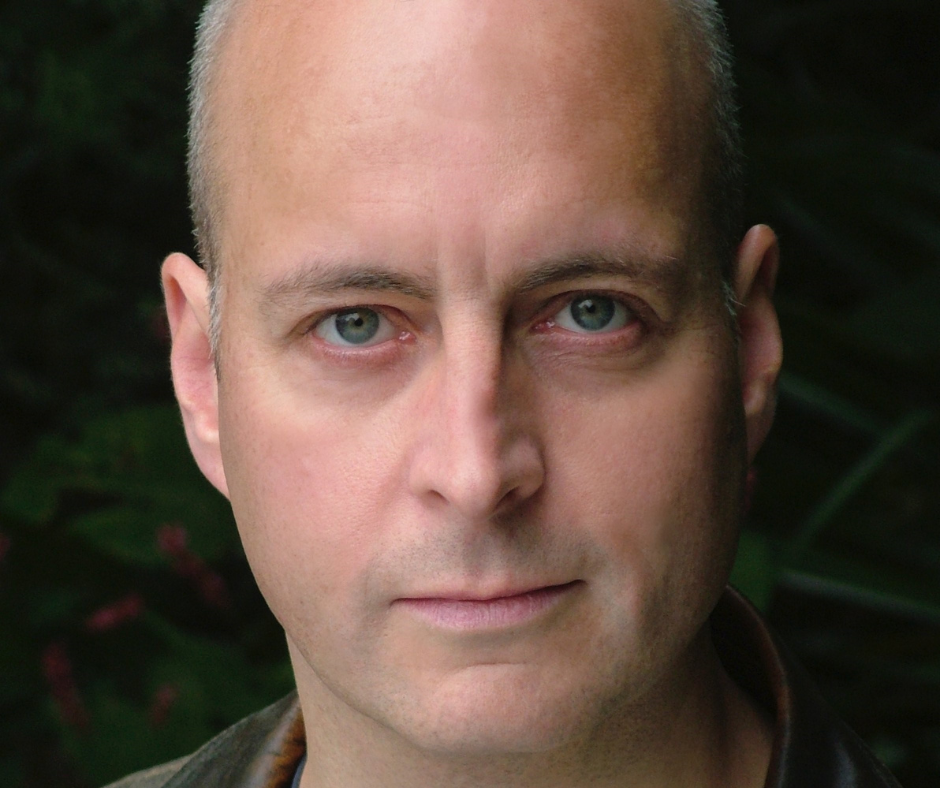Nicholas Pegg
Alumnus Nicholas Pegg (he/him) is an actor, writer and director and studied English Literature at Exeter from 1986-1990, graduating with an MA. During his time at Exeter he was president of the Student Theatre society, and took part in many productions on campus and on the Edinburgh Fringe. Happy memories include playing Dr Faustus in an open-air production in the Queen’s Building quad, directing 'The Merchant of Venice' and 'Hamlet' at the Northcott Theatre, and shaving his head (something that’s no longer necessary!) to play Joe Orton’s lover Kenneth Halliwell in 'Diary of a Somebody', a production which also marked the first time that he and his long-term partner (and fellow Exeter alum) Barnaby Edwards ever acted together. We recently caught up with him ahead of LGBTQ+ History Month 2023 to hear what the month means to him.
What does LGBTQ+ History Month mean to you/why is it important to you?
The way things are going in this crazy world, I think LGBTQ+ History Month feels more important with every passing year. Over the course of my lifetime, we’ve come a long way - I was born only a few months after the decriminalisation of homosexuality, and I’ve lived through the dark days of HIV and Section 28, the long struggle to equalise the age of consent, adoption rights, civil partnerships, marriage equality, and so on. All battles, all of them hard-won, but we must never make the mistake of assuming that those rights can never be taken away from us - there are plenty of people out there who would love to do just that, and around the world they are being emboldened by ranting zealots and unscrupulous politicians. So the battles go on, and there’s always a new front line. The appalling way that our trans brothers and sisters are being treated right now speaks for itself. But together we’re strong, and our history is what binds us. As we forge into the future, we must never forget the journey we’ve travelled. So yeah, I’d say LGBTQ+ History Month is bloody vital.
Do you have any LGBTQ+ role models that inspire you? Who and why?
We all have role models and heroes who date from our formative years, and for my generation I suppose a lot of them came from the world of pop music. When I was a young teenager in the early 1980s, there was a sudden and unprecedented leap forward in LGBTQ+ representation with the arrival of bands like like Soft Cell, Bronski Beat and Frankie Goes to Hollywood. Switching on the TV as a boy and seeing artists like Marc Almond and Jimmy Somerville on Top of the Pops meant a great deal at the time - you suddenly felt a lot more ‘seen’, as we say these days. And to a great extent these were all people who themselves had been liberated a decade earlier by the emergence of a truly great artist, David Bowie. Now he’s a real hero of mine. When Bowie declared himself bisexual in the early 1970s he kicked down a whole lot of barriers overnight. He shone a light into a lot of lives and he really made a difference. And right now in the present day, I feel every bit as encouraged by the spirit and power of a new generation of artists like Olly Alexander and Lil Nas X, and young actors like my friend Gabriel Clark. They’re carrying the torch forward and making the world a better place for gay kids today, and they’re not taking any nonsense. I find that really inspiring.
What career or personal achievement/s are you most proud of?
Well, pride is a perilous current to swim in, but I mentioned David Bowie a moment ago, and I suppose I’m quite proud of the book I wrote about him. It’s called The Complete David Bowie, and since it was first published it has opened up all manner of weird and wonderful things that have come my way in the world of ‘Bowieology’ - everything from working with the V&A Museum on its Bowie exhibition a few years ago, collaborating with the BBC on Bowie documentaries, with the Royal Mail on Bowie stamps, and advising on the recent film Moonage Daydream. David Bowie himself was always very kind and supportive of my book. We all miss him terribly, but the music goes on. I’ve just written some chapters for a new book marking the 50th anniversary of Aladdin Sane. And I’m flying to New York this summer to host a Bowie convention. That whole community is wonderful. There’s a great deal of love and creativity in Bowie fandom, and there’s a strong LGBT+ connection as well. In fact, every year I also compere a charity Bowie night in London, in aid of the Terrence Higgins Trust. Over the years the fans have raised many thousands for that brilliant cause. So that makes me feel both proud and honoured.
And of course I’m inordinately proud of being a Dalek as well. As a little boy I was a huge fan of Doctor Who, and growing up to become a Dalek has been one of the greatest thrills of my acting career. Barnaby and I have been Daleking for decades now, and it never stops being exciting!
Rather like the David Bowie book, one of the marvellous things about being a Dalek it that it brings with it all sorts of wonderful extra-curricular activities. In my capacity as a Dalek, I’ve done Children in Need sketches with Harry Hill, I’ve done awards ceremonies, I’ve done live episodes of Blue Peter - and without a doubt the greatest honour was to shoot that little Dalek scene in that fantastic Channel 4 drama It’s a Sin. Of course Barnaby and I know Russell T Davies well from Doctor Who, and also the producer Phil Collinson, so it was lovely when they invited us up to Manchester to shoot that sequence. As you may know, the principal character in It’s a Sin, Ritchie, was partly based on a young actor called Dursley McLinden, who did actually appear in a genuine Dalek episode of Doctor Who back in the 1980s, at around the time that he first got ill. So that scene was a little tribute to Dursley. And of course, the whole serial was a tribute to that generation, a tribute to our friends who didn’t make it. As young LGBTQ+ people in the 1980s and 1990s, we sat at more bedsides and went to more funerals than we should ever have had to, and it’s such an important story to keep alive. So yes, my modest contribution to It’s a Sin was only a fleeting moment of Dalek action, but just to be a tiny little cogwheel in that extraordinary series is without a doubt one of the proudest moments of my career.
Oh, and I do play human beings too. I played Hamlet once. Quite proud of that!
Progress has been made in terms of LGBTQ+ rights, equality, and inclusion but what is a change you would still like to see?
Well, the battleground right now is all about confronting the attempts being made by some truly awful individuals to weaponise transphobia, isn’t it? What I find both striking and wearily predictable is that every single one of their spurious ‘arguments’ is a carbon copy of the bigoted rubbish that was hurled at cis gay men decades ago. Back in the seventies, Tom Robinson summed it up as ‘Molesters of children, corrupters of youth, it’s there in the papers, must be the truth.’ And that’s exactly what our trans sisters and brothers are now being attacked with. It will not stand. We’ll get there. But I’m afraid it’s going to be a fight.
Do you have any advice for students at the university?
If I’ve learned anything in my old age, it’s that you really ought to listen to what young people have to say before having the temerity to offer them advice. So I’m all ears. That said, there are plenty of words of wisdom that aren’t mine, so I don’t feel too bad about passing them on. You don’t have to be religious (I’m not) to see the sense in that old prayer about having the serenity to accept the things you can’t change, the courage to change the things you can, and the wisdom to know the difference. And another great piece of advice that springs to mind is that life is not a rehearsal. This is it. We’re already on stage. So let’s get on with it, and try not to bump into the furniture.

Barnaby (left) and Nicholas (right) on stage at a Doctor Who event.

